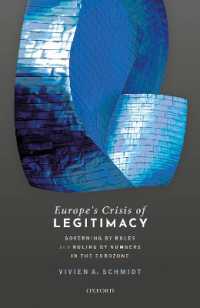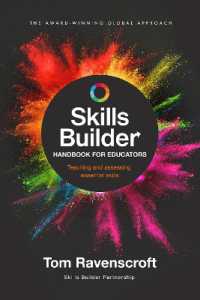Full Description
This book explores the question of how equitable and inclusive education can be implemented in heterogeneous classes where learners' languages and cultures reflect the social reality of mass migration and everyday plurilingualism. The book brings together researchers and practitioners working in inclusive teaching and learning in a variety of migration contexts from pre-school to university. The book opens with an exploration of the relationship between language ideologies and policies with respect to the inclusion of learners for whom the language of education is not the language spoken in the home. The following section focuses on innovative pedagogical practices which allow migrants to be socially, culturally and institutionally included at school and at university while using their plurilingual competences as resources for learning/teaching and allowing them to fully realise their potential.
Contents
Contributors
Acknowledgements
Part 1: Ideology Drives Policy: Rethinking Inclusion
Chapter 1. Christine Hélot: Pushing Back Monoglossic Ideologies of Language: Towards Transformative and Inclusive Pedagogies for 21st Century Multilingual Classrooms
Chapter 2. Judith Purkarthofer: Lines of Exclusion and Possibilities of Inclusion: A Tale of Two Schools in Austria
Renata Emilsson Peskova: The Value of Languages in a Multilingual Classroom
Chapter 3: Julie A. Panagiotopoulou, Lisa Rosen and Jenna Strzykala: Multilingual Teachers Meet Recently Arrived Students: Language Ideologies and Practices in Preparatory Classes in Germany
Maryse Adam-Maillet: Supporting Plurilingual Students through Building Professional Educational Networks
Chapter 4. Nathalie Thomauske: Parents Speaking Other Languages in Early Childhood Settings: A 'Language Barrier' for Building an Inclusive Partnership of Education Between Practitioners and Parents?
Marie-Claire Simonin: Establishing A Relationship of Trust Between Parents and School
Chapter 5. Kirsten Rosiers: 'Dutch if Possible, and Also When It's Not': The Inclusion of Multilingualism in Declared, Perceived and Practiced Language Policies in a Brussels Secondary School
Jordan Foster: The Importance of Supporting Students' First Languages: Avoiding Unintended Consequences
Chapter 6. Junko Majima and Chiho Sakurai: A Longitudinal Study of Emergent Bilinguals among Chinese Pupils at a Japanese Public School: A Focus on Language Policies and Inclusion
Andy Hancock: Inclusive Practices in Multilingual Schools
Chapter 7. Latisha Mary and Andrea S. Young: 'To Make Headway You Have to Go Against the Flow': Resisting Dominant Discourses and Supporting Emergent Bilinguals in a Multilingual Pre-School in France
Frederike Groothoff: From a Monolingual to a Multilingual Approach in Primary Schools in The Netherlands
Chapter 8. Stéphanie Galligani and Diana-Lee Simon: Rethinking Inclusion: A Case Study of an Innovative University Diploma for Refugee Students in Grenoble (France)
Samúel Lefever: The Empowering Role of Teachers
Part 2: 'Actuality Implies Possibility': New Practices of Inclusion
Chapter 9. Roula Kitsiou, Sofia Tsioli, George Androulakis and Inaam Alibrahim: Experiences, Challenges and Potential of Implementing a Participatory Approach to Designing Educational Material for and with Refugee Women in Greece
Sylvie Birot-Freyburger: Recognising Parents as a Resource
Chapter 10. Maite T. Sánchez and Ivana Espinet: Transforming Our Classrooms to Embrace Students' Multilingualism Through Translanguaging Pedagogy
Joy Pénard: Monolingualism as a Cure for Language Disorder?
Chapter 11. Timea Kádas Pickel: 'Spaces of Power, Spaces of Resistance': Identity Negotiation Through Autobiography with Newcomer Immigrant Students
Kia Kimhag: Understanding, Adapting and Being Noticed in a New School Context
Chapter 12. Vicky Macleroy: Framing Critical Perspectives on Migration, Fairness and Belonging Through the Lens of Young People's Multilingual Digital Stories
Marie-Paule Lory: A Non-Traditional Approach to Listening to Students' Voices
Chapter 13. Ann-Birte Krüger and Nathalie Thamin: Inclusion Strategies for Emergent Bilingual Pupils in Pre-School in France: The Importance of the Home-School Relationship
Jean Conteh: Funds of Knowledge in Home, School and Research
Chapter 14. Ondine Gage: Teacher Language Awareness: A Personal and Pedagogical Journey
Mayo Oyama: Awakening to Languages for Japanese Primary Schools
Chapter 15. Rosa Maria Faneca, Maria Helena Araújo e Sá and Sílvia Melo-Pfeifer: Fostering More Inclusive Linguistic Practices in Portuguese Classrooms: Is Teacher Education the Key for Integrating Heritage Languages?
Kathelijne Jordens: Suitably Equipped: Towards Confidently Handling a Multicultural Class
Chapter 16. Jim Cummins: Pedagogies of Powerful Communication: Enabling Minoritized Students to Express, Expand and Project Identities of Competence
Glossary
Index








